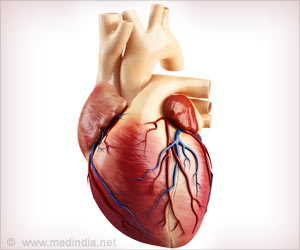Personalized therapeutic drugs to treat heart failures can be developed with the help of new 36 genes discovered, finds a study.

The ultimate goal is to create personalized therapeutic drugs to reverse heart disease. Scientists are probably still a decade away from achieving that sort of tailored therapy, Karma said. But companies interested in developing such drugs can use the method he and his colleagues developed and the genes they identified to get a step closer.
The framework described in the paper can also be used to predict whether individuals suffering from a particular disease will respond to a given drug treatment, said lead author Marc Santolini, a postdoctoral research associate at Northeastern’s Center for Complex Network Research.
"The method can predict beforehand whether a patient should be prescribed a different drug using just a simple blood test. This would save time and accelerate the therapy," Santolini said. "In general, this research highlights the importance of personalized approaches to uncover novel disease genes and better understand disease processes."
The traditional approach to finding genes related to heart disease works like this: Scientists take donated hearts from people who died unexpectedly but were previously healthy. They analyze the gene expression--that is, the amount of messenger RNA and proteins--produced by the genes of healthy hearts and compare it with the gene expression of sick hearts explanted from end-stage heart failure patients undergoing heart transplant.
"You see a different gene expression profile," Karma said. For example, if a gene found in the sick hearts expresses twice the amount of RNA as it did in the healthy hearts, it might be relevant to the disease. But so far, Karma said this method hasn’t been very successful in finding important genes.
Advertisement
Scientists took two mice from the same strain and gave one of them a stressor drug that induces heart failure. They then compared the stressed mouse’s gene expression with its non-stressed twin. Since the mice have the same genome, they were able to pinpoint individual genes that changed expression as a direct result of the heart stressor. The scientists identified 36 such genes.
Advertisement
One of the genes Karma found, called RFFL, was previously known to scientists to be implicated in other cardiac processes. However, it was not known to be related to hypertrophy, said Gideon Koren, a physician and director of the Cardiovascular Research Center at Rhode Island Hospital & the Cardiovascular Institute. Koren has been studying RFFL in his lab for the past two years.
"All of the sudden, this study reveals the gene is important for the hypertrophic trait," Koren said. "We now think that RFFL is an important node that can cross-talk with cardiac hypertrophy failure and cardiac excitation." Cardiac excitation is the process that enables the chambers of the heart to contract and relax. "That was something that we wouldn’t have explored, given what we knew about RFFL," Koren added.
As a next step, Karma said the new method could be tested on human stem cells, which have the same genetic code as the person they came from and can be induced to have similar gene expression patterns as heart cells.
"When you are comparing two populations of cells from the same person--one that has been controlled and one that has been under the effect of a drug or stressor--you can compare the change of gene expression in a personalized way," Karma said.
Source-Eurekalert















